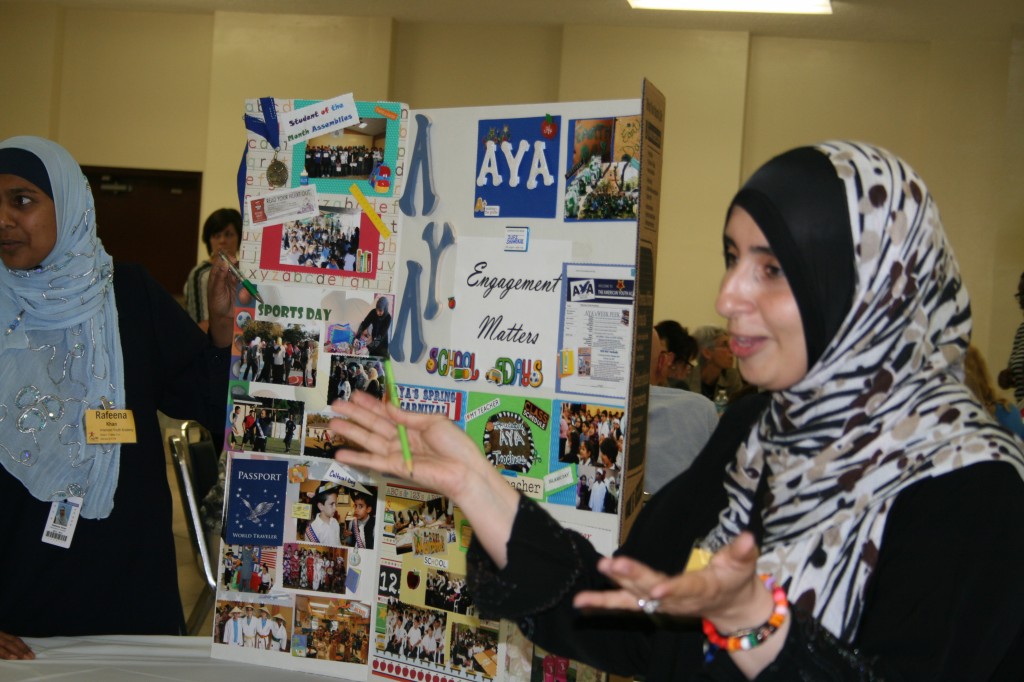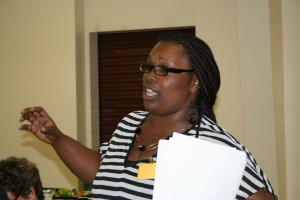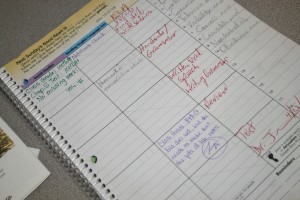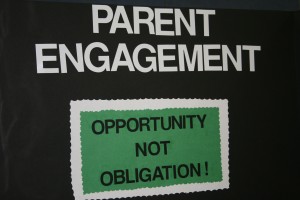
First-grade teacher Manal Ramadan explains to other educators how to get parents more involved at school. Ramadan, of American Youth Academy in north Tampa, was participating in Step Up For Students' first Success Partners Celebration Showcase at Incarnation Catholic School.
Teacher Tiffany Smith-Sutton noticed right away the difference it made when parents came to their child’s school to bake cupcakes or learn about fractions during Family Math Night.
Homework came back on time. Test scores went up. Classroom behavior improved.

Tiffany Smith-Sutton of Bible Truth Ministries Academy talks about enticing parents to come to their child's classroom.
“With their parents there, students are good,’’ said Smith-Sutton, a first-year preschool and kindergarten instructor at Bible Truth Ministries Academy in Tampa.
And parents grow more involved in their child’s education.
It’s that connection that Step Up For Students, the nonprofit that oversees Florida’s tax credit scholarships, hopes to replicate in all 1,300 schools it works with through a free program designed to strengthen the bond between schools and families.
Success Partners started in 2011 with 10 private schools in Tampa that accept tax credit scholarships. The idea was to let each school come up with a way to forge better relationships with parents that meets their specific needs.
School teachers and administrators took part in a year-long training to learn how to create their parental engagement partnership plans. A key part is the Learning Compact, a web-based software application that introduces school leaders to new Common Core State Standards; state-of-the art learning and teaching strategies; and parent and student interventions.
Step Up For Students, which co-hosts this blog, added 17 more schools in the Tampa Bay area to the program in 2012-13. All but one of the schools came together last week to showcase what’s working and to inspire other educators to join the effort. The project will include more than 100 schools this fall.
“When parents are engaged in their children’s learning, children succeed,’’ said Carol Thomas, Step Up’s vice president for student learning and one of the creators of Success Partners.
About 170 teachers and principals from as far away as Venice, Fla., attended the evening event at Tampa’s Incarnation Catholic School. Participants were treated to five sessions, each with about a dozen school faculty presenting parent engagement plans for the school year.
St. Peter Claver Catholic School in Tampa tried to increase communication between parents and teachers through a program it called “Mad Gab, Anyone?” Teachers sent students home with planners that gave parents a way to talk to teachers daily, writing out questions and concerns. They also included notes about student progress and behavior.
“This allowed parents with busy schedules to still feel involved and aware of their child’s education,’’ the educators wrote in a school brochure.

Some schools participating in Success Partners are using daily planners to engage parents in their children's education.
They found parent participation rose from 16 percent to 55 percent after one year. They also noted that students whose parents used the planners had higher grades on average and behaved better in the classroom.
At American Youth Academy in north Tampa, first-grade teacher Manal Ramadan talked about the importance of bringing parents together at social events, like Cultural Day, which highlighted ethnic foods from around the globe.
“We brought in so many parents – some came with strollers,’’ she said, noting it can be difficult, sometimes, for families with younger children at home to participate in school events. “The kids were so excited that their parents were there.’’
Other events included a Welcome Back to School day that allowed parents to stay for the first hour of lessons. Next year, Ramadan said, teachers will ask five of their active parents to bring in five not-so-active ones to help expand the school’s reach.

Dunedin Academy took the direct approach with parents, offering activities that helped build self-esteem - for mom and dad, and for their children.
Some schools brought elaborate story boards to highlight their efforts. Dunedin Academy introduced Science Night, Family Karaoke, community service projects, a book fair, book club and etiquette classes - all with the goal of getting parents in the classroom.
That’s the No. 1 goal for Smith-Sutton, the Bible Truth Ministries Academy teacher. The University of South Florida graduate, who studied biomedicine, has been known to walk up to parents’ cars and personally invite them to her classroom.
Sometimes that means enticing them with fun stuff, like baking cookies or making fruit kabobs. Sometimes, it means offering them a mini-course on teaching, like showing their children that math is part of everyday life.
Even if parents work, Smith-Sutton said, “I have to get them here every week.’’